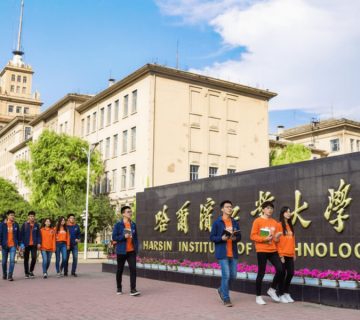Imagine yourself on the colorful streets of Shanghai, where skyscrapers pierce the clouds and the hum of innovation never ceases. At the heart of this world city lies Fudan University of Shanghai, a place for ambitious brains from all over the world. Established in 1905, Fudan has transformed from a humble liberal arts college to one of China’s most respected institutions, marrying Eastern tradition with innovative global scholarship. For foreign students targeting Fudan University of China admission requirements, the adventure begins with learning what makes this institution unique—not merely the ivy-covered walls, but its promise of real-world impact. If you’re drawn to the Fudan University of Shanghai rates that offer fantastic bang for your baht, or the variety of majors that span the gamut from ancient philosophy to finance based on AI, there’s something here for dreamers who wish to build something lasting. In this article from admission institute, we’re diving into the details: from program choices to fees, rankings, and the Fudan university of Shanghai tuition fees that make Fudan unforgettable. Let’s get started, shall we?
A quick look at Fudan university
| Category | Details |
| Popular Majors | Chinese Language, Economics, Computer Science, Clinical medicine, business administration |
| Tuition Fees (Annual, RMB) | Undergrad: 23.000-50.000 ($3.200-$7.000)/ Graduates: 30.000-80.000 ($4.200-$11.200) |
| Living Costs (Monthly, RMB) | 1.500-3.000 ($210-$420) for food, transport and entertainment |
| Admission Requirements | Highschool diploma (undergrad), HSK/TOEFL/IELTS, transcript, recommendation letters |
| Scholarships | Chinese Government Scholarships, Fudan university scholarships (50-100% coverage) |
| World Rankings (2025) | QS: 44th, Times Higher Education: 39th, ARWU: 37th |
Updated 10/26/2025

Fudan University Majors
Diving into Fudan University of Shanghai majors is like opening a treasure chest of choice. With over 70 undergraduate programs and an overwhelming array of graduate programs, Fudan has something for those searching for depth and diversity. I remember talking to a recent alum who switched from economics to environmental engineering throughout her degree—Fudan’s versatility made it simple. The university organizes its programs in 18 schools, each being a power center in its own right, so you can tailor your path without feeling trapped.
1. School of Humanities
Start with the School of Humanities, where the smell of old books and new ideas wafts through the air. Classes like Chinese Language and Literature aren’t just about reciting Tang dynasty poetry; they’re immersive explorations of the construction of society through language. You’ll learn from modern prose and classical literature, perhaps even writing a thesis on online narratives in China.
2. Foreign Languages and Literatures
Foreign Languages and Literatures? That’s where language chameleons spring to life—English programs emphasize cross-cultural engagement, while Japanese or French programs involve study abroad programs, where you partner with partner universities in Tokyo or Paris. History majors excavate artifacts in simulated diggings, marrying archaeology and geospatial mapping technology reminiscent of a science fiction novel.
3. Social Science
Step into the social sciences, and it’s going into a think tank. Fudan sociology deals with real headaches, like megacity urban migration, through field research within Shanghai’s vibrant neighborhoods.
4. Political Science
Political Science, within the School of International Relations and Public Affairs, isn’t dry theory—students argue in pretend UN sessions or at think tanks, dissecting U.S.-China relations with professors who’ve briefed governments.
5. Economics
Economics, a crown jewel, has streams in financial engineering that instruct you how to code stock markets using Python, readying you for Wall Street or Shenzhen trading floors.
6. Mathematical Sciences
For mathematically bent students, the School of Mathematical Sciences delivers. Math majors work on topology problems that could yield quantum computing breakthroughs, while Statistics combines big data analysis—think election prediction or supply chain optimization.
7. Computer Science
Computer Science? It’s energized. You’ll craft AI algorithms as sophisticated as Silicon Valley startups, with cybersecurity electives that have set grads up at Huawei or Google.
8. Life sciences
Life sciences don’t lag behind either. Life Sciences’ biology researches genomics in CRISPR labs, where you might actually be able to engineer genes to fight diseases in plants.
9. Medical Sciences
Basic Medical Sciences’ School has a six-year Clinical Medicine curriculum that is grueling but beautiful—lectures in class give way to rotations at Huashan Hospital, considered among the best in Asia. Public Health majors examine pandemic epidemiological trends from Fudan’s studies on the COVID front lines.
10. Management
Business minds meet at the School of Management. Business Administration is not generic MBA training; it’s brainstorming with alumni CEOs, focused on green economy models that will be sustainable for China. Marketing dives into consumers’ minds through WeChat campaigns, and Accounting sharpens forensic skills for auditing giants like PwC.
11. Environmental Science and Engineering
Don’t sleep on the high-tech schools. Environmental Science and Engineering clean up Shanghai’s smog with pollution-busting technology, like bio-filters that clean rivers. Chemistry students make nanomaterials for batteries, and Physics explores quantum entanglement in particle accelerators. The School of Pharmaceutical Sciences churns out drug discovery pipelines, from bench to clinic.
12. Graduate studies
Graduate studies crank up the volume. Masters in International Relations? You’re co-authoring research studies on Belt and Road geopolitics. PhDs in Computer Science push machine learning boundaries, typically funded by government grants. What are the hallmarks? An interdisciplinary environment—pair economics with data science for fintech acumen. Global mobility is the norm, with English-language courses making it easy to transition. Hands-on research begins on day one, with labs featuring Nobel-grade equipment. Undergrads get internships at Baidu or state ministries, while graduates get published in Nature or Harvard Business Review.
Fudan university of Shanghai majors are not bullet points on a brochure; they’re ways to mastery. As one prof told me, “We don’t teach subjects; we forge thinkers.” If Fudan University of China admission requirements intrigue you—high school diploma for undergrads, bachelor’s for grads, and language evidences such as HSK or TOEFL—start looking at the official site. It’s where the magic begins.

Cost of Studying in China
Being an international student in China, particularly at a gem like Fudan University of Shanghai, turns the tables on “costly education.” Bury the urban legends about sky-high expenses; it’s a worthwhile gamble for savings. Based on our conversations with existing students, the shocking surprise is how far your money goes in Shanghai—everything from street stall xiaolongbao for pennies to bullet trains to Beijing for under the cost of a New York subway ticket.
1. Tuition Fees
Break it down: tuition first. For international undergrads, budget 23,000 to 30,000 RMB annually (approximately $3,200-$4,200 USD) for humanities and social sciences, up to 40,000-50,000 RMB ($5,600-$7,000) for STEM fields such as computer science or medicine. Grads? Master’s degrees run at 30,000-60,000 RMB ($4,200-$8,400), while PhDs are typically subsidized if you’re research-minded. English-language MBAs might drive higher, approximately 80,000 RMB ($11,200), but that’s still a steal compared to Ivy League rates.
2. Accommodation Fees
Accommodation seals the deal. Fudan’s foreign dorms—Handan or Jiangwan campuses, for instance—charge 2,000-6,000 RMB ($280-$840) per semester for a single or double room with AC, Wi-Fi, and laundry facilities. Off-campus? Shanghai rental markets offer studios for 3,000-5,000 RMB per month ($420-$700), though dorms win the prize for convenience and group barbecues.
3. Food and Transportation
Food prices? Spend 1,500-3,000 RMB ($210-$420) a month on meals—cafeterias serve good meals for 10-20 RMB ($1.40-$2.80), and meal-delivery apps like Meituan make vegan or halal convenient. Transportation’s a breeze: metro cards are 20 RMB ($2.80) for unlimited trips, and Mobike bikes are spare change. Fun? Free parks, 50 RMB ($7) museum entry, and student-priced KTV nights are a blast without breaking the bank.
4. Additional costs
Health insurance is mandatory—Fudan packages it for 800 RMB ($112) per year, covering 70-80% of necessities. Visa fees? JW202 processing is free through the university but your home country embassy may cost $140 for the Z visa. Books and sundries add 1,000-2,000 RMB ($140-$280) per semester.
Total for an undergrad year? Perhaps 50,000-70,000 RMB ($7,000-$9,800), absolutely everything. Grad students will get up to 60,000-90,000 RMB ($8,400-$12,600). That’s against U.S. privates of $60,000+. China’s a bargain.
5. Scholarships
But the catch is: scholarships in China. Fudan offers the Chinese Government Scholarship (full package: tuition, dorm, stipend of 2,500-3,500 RMB per month), as well as university-specific scholarships that cover 50-100%. Get in early through the International Student Office; tough competition but fair. I have one student friend who, as an economist from Kenya, financed her entire master’s this way—flights included.
Costs of study in Shanghai vary, but Fudan’s transparency stands out. Check the official ISO site for 2025 news. Not only is it affordable; it’s an investment in a global network. While prices are rising everywhere else on the planet, Fudan University of Shanghai fees recall us: world-class education does not have to cost an arm and a leg.

Fudan University World Rankings
Rankings aren’t the only thing, but they tell secrets about a university’s pulse. Fudan University in Shanghai always punches above its weight, socializing with Oxford and MIT while staying rooted in China’s dynamism. According to credible tallies like QS and Times Higher Education, Fudan’s ascent is no fluke—it is fueled by relentless innovation and a talent for producing leaders who shape tomorrow.
1. Global Rankings
In the QS World University Rankings 2025, Fudan ranks 44th globally, moving up from 50th last year. That’s Who’s Who company: above UCLA and Toronto, only behind by a strand of hair from Carnegie Mellon. What drives it there? Academic reputation clocks a clean 98.7/100, thanks to professors who have been Nobel-nominated in physics and economics. Employer rep? 97.2—grads flood Goldman Sachs and Tencent, their Fudan finish unmistakable.
Times Higher Education’s 2025 vision places Fudan 39th worldwide, up from 2024’s 44. Their metrics love Fudan’s research heft: 92/100 citation marks, with papers pouring on AI ethics and climate simulation. International outlook? A solid 100, with 25% international students and partnerships with 300+ unis ranging from Harvard to Heidelberg. Shanghai Ranking (ARWU) names it as it sees it at 37th worldwide for 2024 (2025 to follow), with a boost in natural sciences—top 50 for physics, chemistry, and math.
2. Local Rankings
Locally, Fudan stands supreme and is known as one of the bests to study in Shanghai universities. QS Asia 2025 crowns its 4th, behind just Tsinghua and Peking, but ahead of NUS. THE Asia? 5th, in its teaching (85/100). By subject, it’s a feast: QS 2025 ranks Modern Languages 12th globally, Economics 28th, and Medicine 39th. Computer Science hits 51-100, spurred by quantum labs on CERN’s level.
These are not ego numbers; they’re proof of Fudan’s alchemy—converting Shanghai energy into academic gold. I have seen rankings change firsthand; Fudan’s rise tracks China’s, from upstart to superpower. For Fudan University of China job seekers, these numbers are no exaggeration—they’re your key to a talent-rich job market. As one recruiter puts it, “Fudan on a resume? It’s a ticket to the corner office.”

Benefits of Studying at Fudan University
Why Fudan? Okay, fine. There are the numbers and the euros preserved, but it is the intangibles that make you go—the arguments late into the night in teahouses, the family that becomes your guides, the sense of belonging to something epic. Study at Fudan University of Shanghai is not a checklist; it’s an adventure, merging serious study with a life that buzzes with promise.
1. Energized Campus Life
Campus life? Energized. Handan Campus unfurls like a green oasis in a sea of skyscrapers—paddle-boat lakes, libraries housing 10 million books, and buzzing cafes full of multilingual chatter. Jiangwan’s modern vibe is accompanied by gyms, theaters, and innovation parks where hackerspaces spawn startups. Student organizations? Over 200, from Model UN to hip-hop clubs, plus the International Culture Week festivals that turn quad into global bazaar. Mental support is robust—on-call counselors, park yoga—tempering homesickness cramps.
2. Research Study Opportunities
Undergrads author papers with profs on innovations, like AI for cancer detection or green city planning. Grad labs glimmer with electron microscopes and supercomputers; grants roll in from NSFC awards. I talked with one bio major who patented a gene editor by sophomore year—Fudan’s environment makes that normal.
3. International Partnerships
International partnerships twinkle brightest. Double-degree programs with Sciences Po or UC Berkeley mean semesters in Paris or Berkeley, credits intact. Guest speakers from IMF economists to WHO directors? A foregone conclusion. It’s this network—alumni in 170 nations—that puts your network in overdrive.

4. Career prospects
Fudan’s Career Center feeder programs to Alibaba, Deloitte, or diplomatic assignments; 95% employed in six months, salaries averaging 15,000 RMB ($2,100) first-time. Interpersonal skills also thrive—tenacity from Shanghai’s pace of life, adaptability from multi-cultural teams.
5. Personal Experiences
But the highest value? Personal alchemy. Fudan teaches you to question, to bridge worlds—Confucian philosophy and Silicon ingenuity. It’s where a modest Indian engineer gets to talk at TED, or a Brazilian artist organizes Shanghai Biennale. Like the annual withering of the cherry blossoms, you get remolded, ready to write your page in world history.
Conclusion
Closing this, Fudan University of Shanghai receives you in open arms. From passion-sparking majors to prices that drive dreams, rankings that validate decisions, and benefits that enrich spirits—it’s a no-brainer for the brave. Your Shanghai saga awaits. The benefits—vibrant campus life, innovative research, and a network across the globe—prepare students to lead in a world of dynamism. Navigating through Fudan University of China admissions is the first step towards your path of a revolutionary journey. Amidst the pulsating hub of Shanghai, Fudan turns dreamers into doers and blends heritage with innovation. Seize the chance to pursue studies at Fudan University of Shanghai—your future, boundless and without fear, starts here. For additional information on Fudan university of shanghai Tuition fees, contact us.
1. What are the most important Fudan University of China admission requirements for foreign students?
International students need a high school diploma for undergraduate degrees or a bachelor’s degree for the masters. Documents required are transcripts, personal statement, recommendation letters, and language proficiency evidence (HSK for Chinese-medium programs or TOEFL/IELTS for English-medium programs). Program requirements vary, so check Fudan’s official International Student Office website for precise instructions.
2. What are Fudan University of Shanghai tuition fees?
Undergraduate tuition is 23,000-50,000 RMB ($3,200-$7,000 USD) annually, depending on the program of study. Postgrad education is 30,000-80,000 RMB ($4,200-$11,200). Dorm (2,000-6,000 RMB a semester) and living expenses (1,500-3,000 RMB a month) are other expenses that make Fudan low-cost compared to American/Western universities.
3. What is the benefit of studying at Fudan University of Shanghai?
Fudan offers a vibrant campus, cutting-edge research opportunities, and global connections through partnerships with top universities. Its diverse majors, strong career support (95% employment rate), and Shanghai’s dynamic setting foster personal growth and professional success, making it a transformative choice for students.





No comment